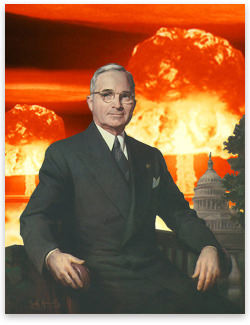Countdown to Hiroshima for July 28,1945: Using the Bomb Against Japan--and the Russians?
 Each summer I count down the days to the atomic bombing of Japan (August 6 and August 9, 1945), marking events from the same day in 1945. See my daily reports for the previous two weeks here. And for past two days here. I've written three books on the subject: Hiroshima in America (with Robert Jay Lifton),
Atomic Cover-Up
(on the decades-long suppression of shocking film shot in the atomic cities by the U.S. military), and
Hollywood Bomb
(the wild story of how an MGM 1947 drama was censored by the military and Truman himself).
Each summer I count down the days to the atomic bombing of Japan (August 6 and August 9, 1945), marking events from the same day in 1945. See my daily reports for the previous two weeks here. And for past two days here. I've written three books on the subject: Hiroshima in America (with Robert Jay Lifton),
Atomic Cover-Up
(on the decades-long suppression of shocking film shot in the atomic cities by the U.S. military), and
Hollywood Bomb
(the wild story of how an MGM 1947 drama was censored by the military and Truman himself).--Two days after receiving it, the Japanese leadership rejected the Potsdam declaration calling for their "unconditional" surrender, or seemed to. The official word was that it would ignore the demand mokusatsu, or "with silence." Another translation, however, is "to withhold comment." This not-quite-rejection has led some historians to suggest that the U.S. should have pursued the confusing Japanese peace feelers already circulating, especially with suggestions that unconditional terms were the main, or perhaps only, obstacles.
--Secretary of the Navy James V. Forrestal had breakfast with Truman at Potsdam. He had flown there at least partly to press the president to pursue Japanese peace feelers--especially concerning letting them keep their emperor-- before using the bomb and killing countless civilians.
--Returning to Washington from Potsdam, Secretary of War Henry Stimson consulted with the top people at Los Alamos about the bomb (or "S-1" as it was then known) and wrote in his diary. "Everything seems to be going well."
--U.S. Ambassador to Moscow Joseph Davies wrote in his diary that Secretary of State James Byrnes was overly excited by the success of the bomb test vis-a-vis future relations with our allies, the Soviets: "Byrnes' attitude that the atomic bomb assured ultimate success in negotiations disturbed me more than his description of its success amazed me. I told him the threat wouldn't work, and might do irreparable harm." Four days earlier, Byrnes aide Walter Brown had written in his diary that Byrnes' view was that "after atomic bomb Japan will surrender and Russia will not get in so much on the kill." The Soviets were scheduled to enter the war on August 7 (which might have prompted a Japanese surrender, even without use of the Bomb), so there was some urgency.
--A U.S. bombing raid on the small Japanese city of Aomori -- which had little military significance beyond being a transportation hub -- dropped 83,000 incendiaries and destroyed almost the entire city, killing at least 2,000 civilians.
Published on July 28, 2013 07:01
No comments have been added yet.



